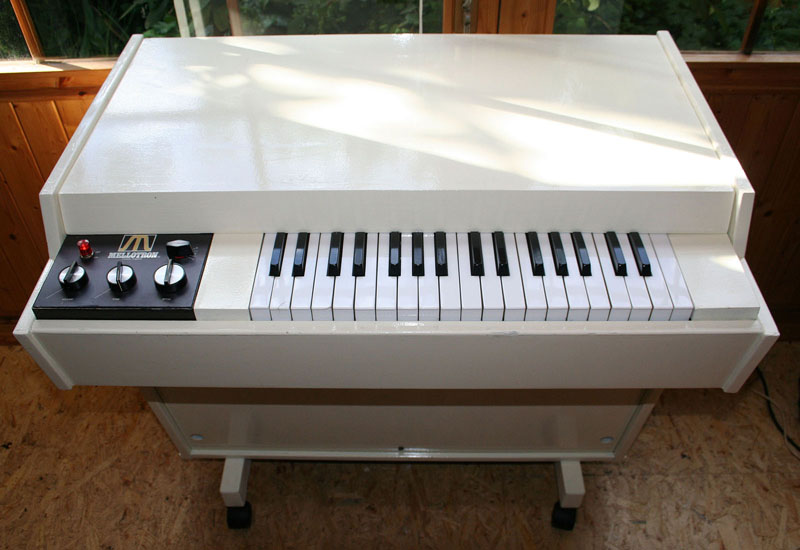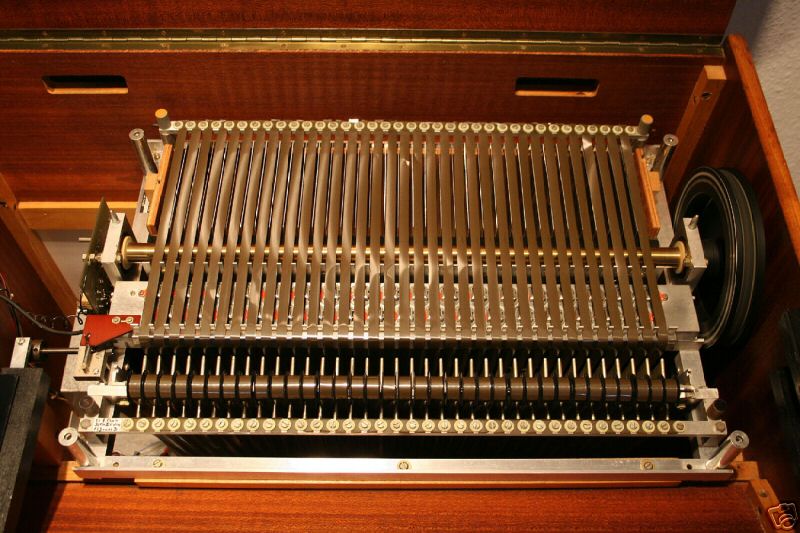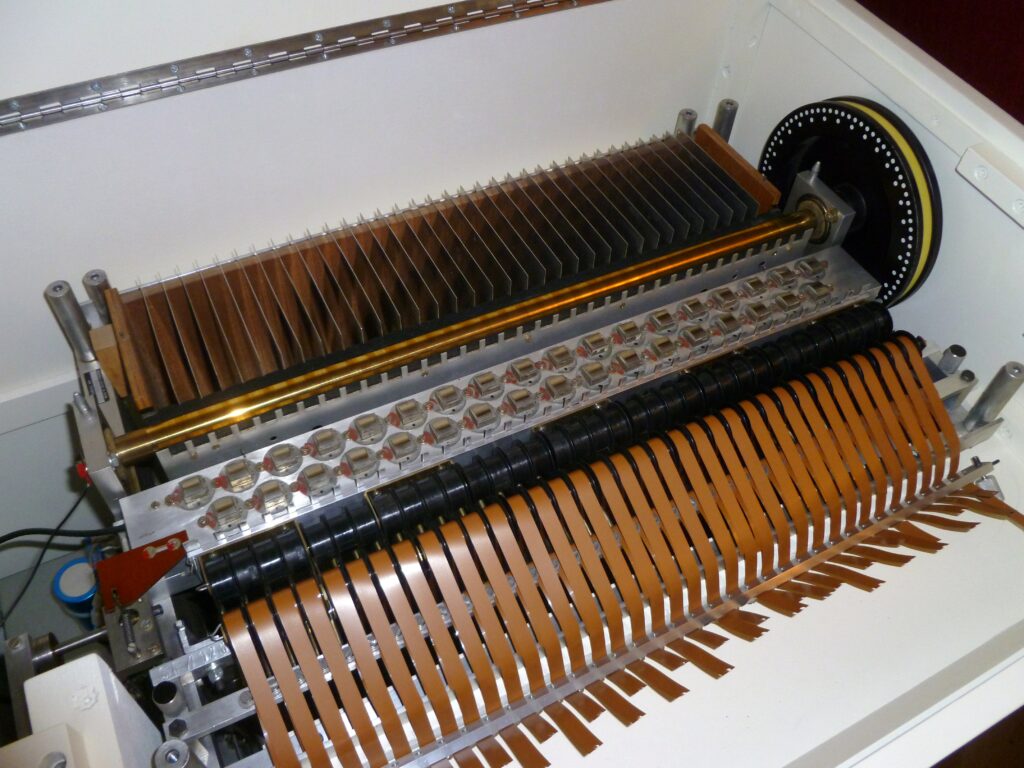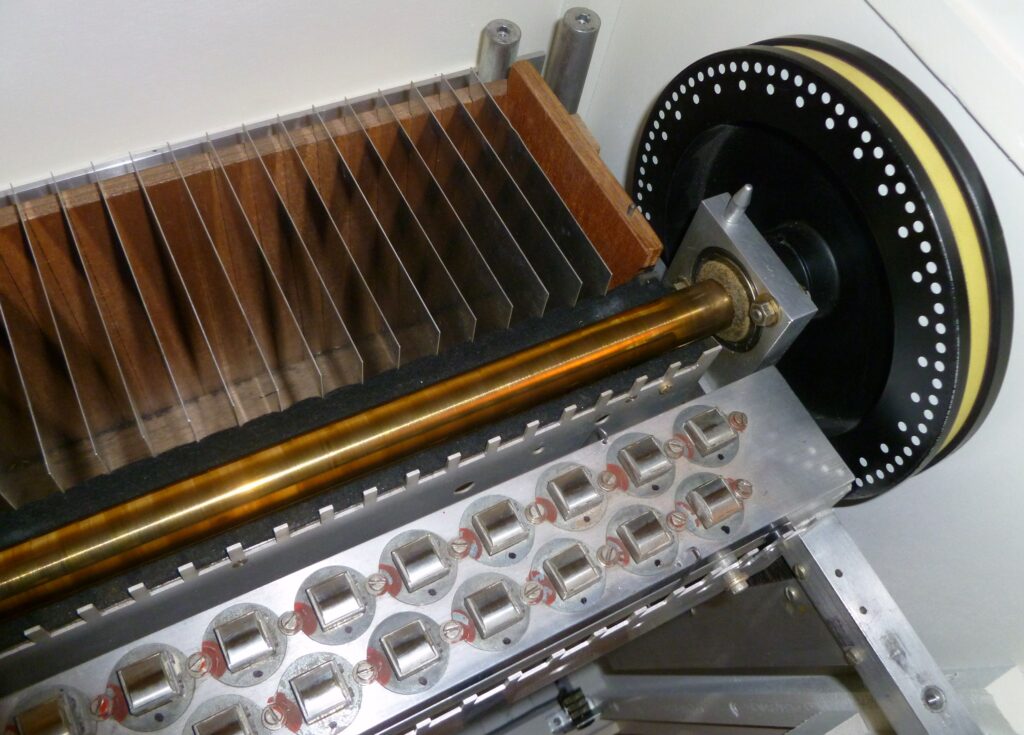SPECIFICATIONS
| Years of Production | 1970 – 1977 – Novatron: 1978 – 1986 |
| Number of Units | about 2 000 |
| Original Price | £795 – Novatron: £1,374 |
| Dimensions W x H x D | 86 x 82 x 57 cm |
| Weight | 55 kg |
The M400 is the first Mellotron whose size and weight are suitable for relatively easy transport.
It is the most famous and widespread model, its angular shape and white color made it recognizable on the stages of the 70s.
The M400 uses 3/8″ tapes and has one single 35-note keyboard (G to F).
There is no internal amplification, only a solid-state preamp.
The first M400s were fitted with the CMC-10 motor control board.
This unreliable card poses many problems including an audible high frequency in the audio output and a slowing down of the motor from 6 or 7 notes played together.
From 1974, when the Mark V was designed, a Mellotron with two keyboards and two capstans, the CMC-10 board was replaced by a new much more reliable board, the SMS-2, which would then equip all M400s.





The M400s manufactured in the United States from 1977 by Sound Sales Inc. are named M400SM and are equipped with new preamps as well as an SMS-3 motor servo board.
The control panel exists in 4 versions:
- the most widespread has an aluminium sheet (the Novatron version has a badge affixed to the Mellotron name);
- a rarer version has a black sheet on the M400s commercialized by Mellotronics in London;
- a version with a black sheet and different knobs for the EMI 400;
- a version with a black sheet and black and yellow knobs, on the M400s commercialized by Sound Sales Inc. in USA (from 1977).
The standard layout of the tracks is A, B, C from the bottom. Note that on some black plates (Mellotronics and US), the order of the tracks is reversed.






The controls are: Volume, Tone, Pitch Control and a track selector.
An input for a volume pedal is available in the front of the instrument.
At the rear, it has a unbalanced 1/4 inch audio output, and on the most recent models (from 1973 / 1974), an balanced XLR output.
The Mellotron M400 and the Novatron 400 are the same machine; only the name is different [See History].
The Mellotron M400s have a cabinet in white lacquered wood. The Novatron 400s were available in white or black.
The operation of the M400 has been simplified: the multiple soundbank system present on the Mark II and the M300 has been replaced by an interchangeable 35-tape frame.
A frame is equivalent to a bank of 3 sounds.
Each additional tape frame is delivered in a suitcase.
New sounds have been recorded for the M400 including the famous choirs (8 Voices).
The iconic sound of the Mellotron, the 3 violins in unison (3 Violins), was taken from the Mark II sound bank but equalized differently.
The distinction of this same sound played on a Mark II and an M400 can be heard on albums by Genesis (Mark II from 1970 to 1972, M400 from 1973) or King Crimson (Mark II from 1969 to 1971, M400 from from 1973).
It was also possible to provide your own sounds to Mellotronics in order to convert them to 3/8″ format and thus have a custom sound frame. Steve Hackett has recorded his own voice, Paul McCartney has recorded Isle of Mull bagpipes and various sound effects, Black Sabbath has recorded backing vocals, strings and sound effects.

A conversion kit including standard 1/4″ tape guides has been released. With this kit it was possible to record your own tapes with a standard 2-track tape recorder and use them with the M400.
Each M400 was supplied with a volume pedal and a transport cover: The Protecta Muff (Protectomuffs)



After obtaining a license from Streetly Electronics, EMI released one hundred M400s.
Streetly supplied the Mellotrons as a kit, EMI assembled them.
The cabinet is made of varnished wood and the serial number begins with E4.
The vast majority of these poorly assembled models were returned to Streetly for proper reassembly.
In line with the FX Console, a version of the M400 intended for sound effects and delivered with 12 tape frames, each comprising 105 sound effects, was marketed under the name 400FX.
An M400 with a Plexiglass cabinet was manufactured in 1972 at the initiative of Mellotronics for the London Music Expo. This see-through Mellotron allowed to see the internal mechanism and its functioning.
A second model was manufactured by Sound Sales in 1977.
A left-handed model was specially made for Paul McCartney. The settings are located to the right of the keyboard.
A double Mellotron was designed from two M400s for Rick Wakeman in 1973. It will be used on albums and concerts until 1977. [See Photos tab for more details]
Articles
- The Novatron Revisited – Electronics & Music Maker – February 1983
- Sampling Sixties style – Music Technology – April 1989
PHOTOS
- M400 #256 & #1671
- M400
- Jack Bruce’s M400 #1560
- Novatron 400 #B1753
- EMI 400 #E4-126S
- EMI 400 #E4-140S
- M400S Acrylic #1
- M400S Acrylic #2
- Skellotron #003
- Rick Wakeman’s Double Mellotron (Yes)
M400 #256 & #1671
Photos: David Cilia – 2000
My two M400 – #256 has been sold.







M400
Photos: Klaus Hoffmann-Hoock










Jack Bruce’s M400 #1560
Photos: EMEAPP (Electronic Music Education and Preservation Project)
This M400 has been fully restored by Streetly Electronics, and was offered for sale at a Sotheby’s auction on September 29, 2015.
Jack Bruce had made recordings of his voice (some with ADT) for M400 tape frames.
These tapes can be heard on the How’s Tricks (1977) and Automatic (1983) albums.
The American group They Might Be Giants used these sounds on the track I Like Fun from the album of the same name (2018). More information here.





Novatron 400 #B1753








EMI 400 #E4-126S
Photos: Klaus Hoffmann-Hoock










EMI 400 E4-140S
Photos: Andy Kinch
Andy Kinch’s EMI 400
Before restoration


After restoration by Streetly Electronics
This EMI 400 looks like an M400 now. Some elements still allow you to recognize an EMI: brass capstan, the hinge of the cover and the serial number label.















M400S Acrylic #1
Photos: Don Kennedy for Studio Bell – National Music Center









M400S Acrylic #2





Skellotron #003
Photo: Streetly Electronics

Rick Wakeman’s Double Mellotron (Yes)
This Mellotron belongs to Chris Dale. Many thanks to him for the information and photos
Text by Chris Dale
The Yes / Rick Wakeman Double Mellotron was a one-off machine that was put together in 1973 from two previously separate M400 Mellotrons (# 259 dated 1972 and # 332 from 1973). The 1972 M400 is one of two M400s that Wakeman used on Close to the Edge and on his solo album The Six Wives Of Henry VIII (visible on the inside photo of the album).
This Double Mellotron was designed to be more reliable on tour and in the studio.
It was built from a collaboration between Michael Tait (of Tait Towers fame) and Mellotronics / Streetly Electronics and effectually served as an early prototype design and marketing for the later MKV model.
The Double Mellotron has sturdier construction, different electronics, and tapes from alternate Mellotron master tapes, so it sounds different than other Mellotrons.
You can hear the effect of this collective work on the Revealing Science of God from Tales From Topographic Oceans album by Yes: e.g. the lush violins and flutes in the second half of the song. It also appears throughout the rest of the album as well.
The Double Mellotron was used on Tales From Topographic Oceans, Going For The One, (and as separate M400’s on Close To The Edge and Yessongs) by Yes.
It was also used on Rick Wakeman’s Journey To the Center of The Earth, Myths and Legends of King Arthur, No Earthly Connection, and White Rock.
It was used on tours and recordings from 1972 to 1977 and was the most photographed / videographed Mellotron at the time appearing in TV specials, books, tour programs, and film footage throughout the mid 1970’s.
It became Rick Wakeman’s main Mellotron for recording and performances.
It fell into a state of disrepair, theft, abandonment, and re-sale as a wreck throughout the following decades, and was eventually rescued from being sent to the scrapheap by Canadian musician Chris Dale.
He restored the instrument over an 8 year period with help and consultation from Rick Wakeman, Yessongs tech Frank Levi, and service or parts from John Bradley (Streetly Electronics), Markus Resch, and especially Mellotron Professor Jerry Korb who helped restore the original unique electronics in the machine to working order.
Before and under restoration
Photos: Chris Dale
These photos cannot be used without prior written consent.








After restoration
Photos: Chris Dale
These photos cannot be used without prior written consent.






Rick Wakeman and Yes concerts
Photos: internet





VIDEOS

DOCUMENTATION
SOUND LIST
Available sounds at Streetly Electronics
For more information and listen to audio excerpts: Streetly Electronics Mellotron Tape Library
| STRINGS | BRASS | WOODWINDS |
|---|---|---|
| Mk II Violins | Mk II Brass | Oboe |
| M400 Violins (eq’d MKII) | Muted Brass | Cor Anglais/Oboe Split |
| M300A | Trumpet | Bassoon |
| M300B | Trombone | MkII Flute |
| Three More Violins | Mixed Brass B | Vicki Blechta C Flute |
| String Section | GC3 Brass | MkI Clarinet |
| String Section (No Cello) | Two Trombones/Two Trumpets | Clarinet-B |
| Electric String Section | Moog Brass | Bass Clarinet |
| New String Section | Soprano Sax | Piccolo |
| Classic Strings | Tenor Sax | Recorder |
| Violin | Alto Sax | Octave Recorders |
| 16 Violins | Two Tenor/Two Alto | Ian McDonald’s Classical Flute |
| Viola | French Horn | Bass Flute |
| Dickstrings | Glenn Miller | Chamber Woodwinds |
| Cello | Baritone Sax | Woodwind 2 |
| Paravicini Two Cellos | Chamberlin Muted | Chamberlin Bass Clarinet |
| Louise Davis Cello (Vibrato) | Trombone | |
| Louise Davis Cello (Plain) | Chamberlin Trombone | |
| Louise Davis Cello (Pizzicato) | Chamberlin Saxophone | |
| Sad Strings | Chamberlin Octave | |
| Angry Strings | Saxophones | |
| Tony Levin’s NS Electric Cello | ||
| Ric Sander’s Electric Violin | ||
| Cyndee Lee Rule’s Viola | ||
| Chamberlin Violins | ||
| Chamberlin Harp |
| VOICES | KEYBOARDS | GUITARS |
|---|---|---|
| 8 Voice Choir | St John’s Wood Church | Electric Guitar |
| Male Choir | Organ | Spanish Guitar |
| Female Choir | Piano | Steve Hackett’s Sustained Guitar |
| Boy’s Choir | M300 Piano | Adrian Belew’s Sustained Guitar |
| Combined Choir | Mk I Piano Upper Octaves | Gordon Giltrap’s Guitar |
| St Peter’s Choirs | Italian Accordian | Harmonics |
| Russian Choir | Rhodes | Ray Jung’s Fretless Bass |
| Birotron Choir | Moog Taurus Bass Pedals | Twelve String Guitar |
| Chamberlin Solo Female | Moog Whoosh | Ebow Guitar |
| Chamberlin Solo Male | Fairlight Arr1 | Chamberlin Hawaiian Guitar |
| Fairlight Saxy | Chamberlin Electric Guitar | |
| Fairlight Swannee | Chamberlin Mandolin | |
| Plucked Piano | ||
| Hammond C3 Clean | ||
| Hammond C3 Dirty | ||
| American Pump Organ | ||
| Wilden Church Organ | ||
| Chamberlin Accordion | ||
| Chamberlin Piano |
| PERCUSSION | LES BRADLEY MIXES | CHAMBERLIN |
|---|---|---|
| Vibes | Gothic | Violins |
| Marimba | Orchestra | Accordion |
| Glocks/Tubular Bells Split | Medieval Woodwind | Bass Clarinet |
| Cat | Electric Guitar | |
| Chamberlin Vibes | Harp | |
| Hawaiian Guitar | ||
| Mandolin | ||
| Muted Trombone | ||
| Octave Saxophones | ||
| Piano | ||
| Saxophone | ||
| Solo Female | ||
| Solo Male | ||
| Trombone | ||
| Vibes |







